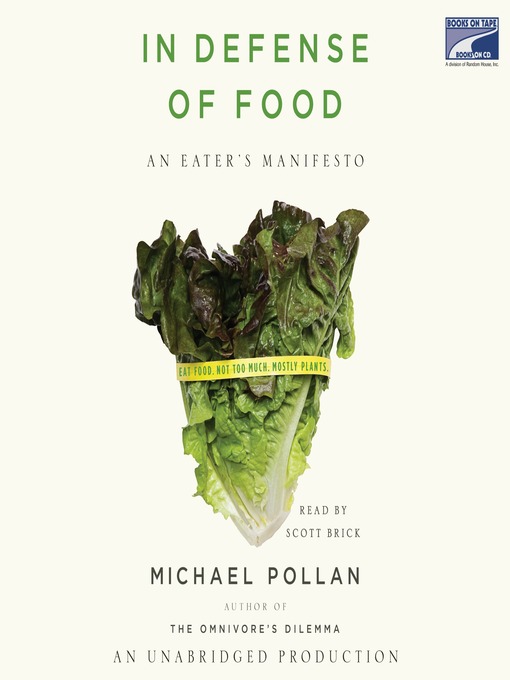Language
English
Audio disc
Summary
Examines eating habits in light of contemporary trends toward ultra diet-concsiousness. Presents arguments for more tradition- and ecology-based approaches to eating rather than regarding foods in more scientific or clinical terms.
View Other Search Results
Language
English
Video disc
Summary
"Eat food. Not too much. Mostly plants." These simple words go to the heart of food journalist Pollan's thesis. Humans used to know how to eat well, he argues, but the balanced dietary lessons that were once passed down through generations have been confused and distorted by food industry marketers, nutritional scientists, and journalists. As a result, we face today a complex culinary landscape dense with bad advice and foods that are not "real." Indeed, plain old eating is being replaced by an obsession with nutrition that is, paradoxically, ruining our health, not to mention our meals. Pollan's advice is: "Don't eat anything that your great-great grandmother would not recognize as food." Looking at what science does and does not know about diet and health, he proposes a new way to think about what to eat, informed by ecology and tradition rather than by the nutrient-by-nutrient approach.--From publisher description.
Electronic Access
Table of contents http://catdir.loc.gov/catdir/toc/ecip0727/2007037552.html Click here to view cover art http://midwesttapes.com/images/movies/11486928.gif
Language
English
Books
Summary
"Eat food. Not too much. Mostly plants." These simple words go to the heart of food journalist Pollan's thesis. Humans used to know how to eat well, he argues, but the balanced dietary lessons that were once passed down through generations have been confused and distorted by food industry marketers, nutritional scientists, and journalists. As a result, we face today a complex culinary landscape dense with bad advice and foods that are not "real." Indeed, plain old eating is being replaced by an obsession with nutrition that is, paradoxically, ruining our health, not to mention our meals. Pollan's advice is: "Don't eat anything that your great-great grandmother would not recognize as food." Looking at what science does and does not know about diet and health, he proposes a new way to think about what to eat, informed by ecology and tradition rather than by the nutrient-by-nutrient approach.--From publisher description.
Language
English
Books
Summary
"Eat food. Not too much. Mostly plants." These simple words go to the heart of food journalist Pollan's thesis. Humans used to know how to eat well, he argues, but the balanced dietary lessons that were once passed down through generations have been confused and distorted by food industry marketers, nutritional scientists, and journalists. As a result, we face today a complex culinary landscape dense with bad advice and foods that are not "real." Indeed, plain old eating is being replaced by an obsession with nutrition that is, paradoxically, ruining our health, not to mention our meals. Pollan's advice is: "Don't eat anything that your great-great grandmother would not recognize as food." Looking at what science does and does not know about diet and health, he proposes a new way to think about what to eat, informed by ecology and tradition rather than by the nutrient-by-nutrient approach.--From publisher description.
Language
English
Audio disc
Language
English
Books
Summary
"Eat food. Not too much. Mostly plants." These simple words go to the heart of food journalist Pollan's thesis. Humans used to know how to eat well, he argues, but the balanced dietary lessons that were once passed down through generations have been confused and distorted by food industry marketers, nutritional scientists, and journalists. As a result, we face today a complex culinary landscape dense with bad advice and foods that are not "real." Indeed, plain old eating is being replaced by an obsession with nutrition that is, paradoxically, ruining our health, not to mention our meals. Pollan's advice is: "Don't eat anything that your great-great grandmother would not recognize as food." Looking at what science does and does not know about diet and health, he proposes a new way to think about what to eat, informed by ecology and tradition rather than by the nutrient-by-nutrient approach
Language
English
Regular print
Summary
"Eat food. Not too much. Mostly plants." These simple words go to the heart of food journalist Pollan's thesis. Humans used to know how to eat well, he argues, but the balanced dietary lessons that were once passed down through generations have been confused and distorted by food industry marketers, nutritional scientists, and journalists. As a result, we face today a complex culinary landscape dense with bad advice and foods that are not "real." Indeed, plain old eating is being replaced by an obsession with nutrition that is, paradoxically, ruining our health, not to mention our meals. Pollan's advice is: "Don't eat anything that your great-great grandmother would not recognize as food." Looking at what science does and does not know about diet and health, he proposes a new way to think about what to eat, informed by ecology and tradition rather than by the nutrient-by-nutrient approach.--From publisher description.
Electronic Access
Additional information at Google Books Table of contents http://bvbr.bib-bvb.de:8991/F?func=service&doc_library=BVB01&doc_number=016413326&line_number=0001&func_code=DB_RECORDS&service_type=MEDIA Table of contents http://catdir.loc.gov/catdir/toc/ecip0727/2007037552.html Author photo https://covers.openlibrary.org/a/olid/OL539266A-M.jpg Cover image https://covers.openlibrary.org/b/id/2325279-M.jpg
Language
English
Video disc
Summary
Tells the story of one of the most important conflicts of our time - the one that each and every one of us fights every time we sit down to have a meal.
Limit Search Results




